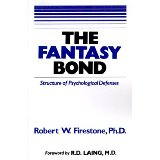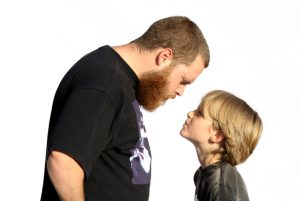The Destructive Ways We Self-Parent as Adults
 The relationship we have with our parents or primary caretakers is almost never black or white. Some of us may be more inclined to idealize our parents, while others may feel especially zoomed in on their shortcomings. Most of us are guilty of both.
The relationship we have with our parents or primary caretakers is almost never black or white. Some of us may be more inclined to idealize our parents, while others may feel especially zoomed in on their shortcomings. Most of us are guilty of both.
As adults, we’re often better able to see that our parents are just human beings with strengths and weaknesses, and we can sometimes identify the positive and negative effects they have had on us. We may even think we have our relationship with our parents “figured out.” Yet, this perspective is very different from the one we had as children when our parents or parent-figures had a much more profound impact on us.
The Role of the Fantasy Bond
As an infant, our parents are literally our key to survival. Their ability, or lack there of, to provide us with a sense of safety, to be attuned to our needs, and to soothe us when we were distressed created the foundation of how we see ourselves, others, and how relationships operate. The strengths and weaknesses they possessed had a powerful effect when we were younger, and that effect is still very much playing out in our lives today. These almost invisible forces internalized from our early experience with our parents help shape the way we act and how we see ourselves throughout our lives. Much of this is due to an illusion of connection or “fantasy bond” we form with our parents in moments of overwhelming distress.
A “fantasy bond” was termed by my father, psychologist and author Robert Firestone, to describe a core defense mechanism that helped us maintain a sense of safety and security at times when we experienced overwhelming frustration, hurt, or even terror. For an infant, the fantasy of being merged with a caretaker can reduce feelings of hunger and frustration. This illusion of connection can serve as a compensation for inadequacies in their care taking. For example, if their parent had trouble making eye contact, soothing them, or often felt fearful, frustrated, absent, or angry, the child may rely on the fantasy of security over the frightening reality of having a parent who feels unsafe. The child internalizes the parent and feels like the helpless child and the all-powerful parent all in one. We parent ourselves the way we were parented, both punishing ourselves and soothing ourselves as we were treated.
This pattern plays out throughout our development as we identify with and internalize our parent in several ways. The first is that we take on their attitudes toward and around us. This is a largely unconscious process. As children, it feels far more threatening to see our parents as flawed than to take the blame on ourselves. Whether a parent was rejecting or resentful or overbearing and emotionally hungry, we tend to make sense of these traits by thinking there was something wrong with us. If the problem lies with us, we have control, which makes us feel safe.
The Inner Voice
We then tell ourselves stories about who we are based on these parental cues and see ourselves through our parents’ eyes. We start to form an “inner voice” that translates the attitudes we picked up from our parents into our own self-concept. If a parent was critical of us or themselves, we take on these criticisms. If we felt like a burden, or that we were too loud, too quiet, too needy, too angry, too shy, etc., we will carry on believing these things about ourselves long after we grow up.
Another way we keep our connection to our parents is by seeing ourselves as like them. One man I spoke to talks about the guilt he feels any time he pays for anything, as he grew up feeling fearful of his mother’s excessive spending. It’s not unusual to take on our parents’ traits as our own. We may act out the ways we saw them act out, or we may rebel against their traits, because we’re so worried we possess them. Either way, we are bending ourselves out of shape, expressing our parent’s way of being rather than our own.
Even if we grow up and start to see our parents more clearly, we still remain largely unaware of this early fantasy bond’s long-term effect on us. We continue to preserve their legacy by putting ourselves down and building them up. It’s not that we think our parents were perfect. We just think they were better than they were, and we still believe we are more inherently flawed than we are.
Part of the reason we’re so stubborn about maintaining these connections is that they were once the very thing that made us feel safe. As kids, our parents were all-powerful forces who needed to be good in order for us to feel safe and survive in an unsafe world. Even after years of arguing, disagreeing, or separating from them physically, we stay connected to our parents in all kinds of ways that exist within us. We may continue to believe their attitudes toward us or project these attitudes onto others. We keep them alive inside us by living out a prescription they wrote for us, almost always without any awareness of what we are doing.
When we self-parent, we repeat patterns from our childhood, especially in our adult relationships. One woman I spoke to described having a mother who tore her down and often felt jealous of her. On the other hand, her father built her up for being “adorable” and showered her with attention until she got older and was no longer a “little girl.”
Throughout her teen and young adult years, her mother remained critical and emotionally hungry, while her father became distant and rejecting. She felt lost and like she needed to be adorable/ adored in her adult relationships in order to get back the positive reenforcement she had felt from her dad. At the same time, she was incredibly critical of herself and her looks much like her mother had been. Living out her parents’ prescription of her left her feeling both like she needed to be the center of attention and like she was unworthy of attention all at once.
Breaking the Fantasy Bond
The point here is in no way to demonize parents or to suggest they intentionally harm their children. As I’ve said, all parents are people and come with their own hurts and histories. Just as their negative traits contribute to our negative attitudes toward ourselves and others, so too do their positive influences enhance our self-concept. There are certainly characteristics we admire in our parents that we’d like to emulate.
However, as adults, we must learn how to differentiate the positive from the negative, to uncover the otherwise invisible forces that do not serve us and to preserve the ones that do. We can break the original fantasy connection and face the pain we’ve held since childhood that was caused by our parents’ shortcomings. Only then, can we be fully free to create a life that reflects who we really are and to build relationships that are grounded in real, healthy ways of relating.
Tags: defenses, development, fantasy bond, personality, psychological defenses, self-esteem, self-parenting, traitsOne Comment
Comments are closed.









Thank u! Looking forward to the webinar